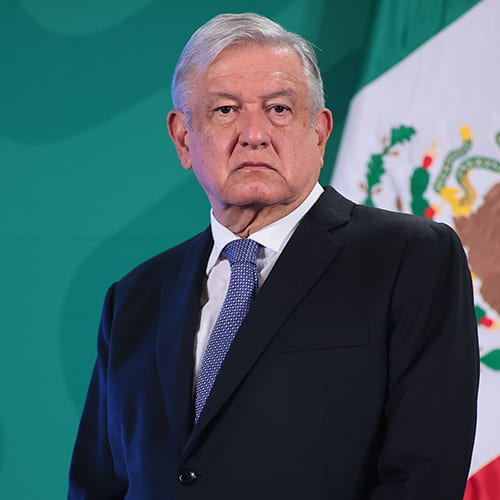By Gary J. Hale
Nonresident Fellow in Drug Policy and Mexico Studies, Center for the U.S. and Mexico
Mexico’s President Andrés Manuel López Obrador (AMLO) announced today that he intends to grant freedom to thousands of federal prisoners, including prisoners who claim they were tortured during their arrest or during their contact with the judicial system, sick and elderly prisoners, some prisoners who had not committed serious crimes, and those who have been incarcerated for at least a decade, but not adjudged properly.[1] While the gesture and act seem to be benevolent and just, the fact that so many Mexicans have been determined to have been improperly jailed speaks directly to the failure of the judicial system, including a lack of due process. The Mexican judicial system is rife with inadequacies, including politicized investigations, shabby collection of evidence or fabrication of such, improper indictments, unlawful arrests, a corrupted judiciary, unlawful releases and now, by admission of the president himself, the unjust detention and incarceration of many of those who would otherwise serve their sentences, had the appropriate and proper legal processes been followed.
The emptying of Mexican jails may be akin to the Mariel Boatlift of 1980, when Fidel Castro allowed would-be émigrés to leave the communist island.[2] In the ensuing exodus, about 125,000 Cubans floated their way from the port of Mariel, Cuba, to the shores of Florida in a flotilla that comprised any type of boat that could float. As the boatlift reached its peak, it was discovered that the “Marielitos,” as they were called, included not only oppressed émigrés but also a significant number of criminals released from Cuban jails and people with psychological aliments that had been interned in mental health facilities.[3] The arrival of so many criminals in Florida resulted in an increased number of killings in that state; by 1982, murder and crime rates had soared. The Drug Enforcement Administration (DEA) reported that in 1979, there were 349 murders — or almost one drug killing per day in Miami — and that by 1981, murders had climbed to 621. In February 1982, President Ronald Reagan announced the establishment of the Southern Florida Task Force to deal with the increasing crime.[4] Much of that crime and violence was attributed to the criminals who had been dumped into Florida by Castro.
Will history repeat itself? The Mexican government may portray its release of prisoners as the righting of a wrong, but in doing so, AMLO is wielding a double-edged sword. On the one hand, AMLO’s decision may provide short-term domestic political gain by appealing to the masses, but on the other, should criminality spill over to the U.S. because of this decree, the implications could negatively impact the long-term binational relationship. Internally, the release may cause discontent among the Mexican families of the 43 victims who disappeared in Iguala, Guerrero, in 2014, since some of the incarcerated suspects may be set free because they were allegedly tortured during the investigation. Regardless of whether they are murderers in fact, they are among the many prisoners who meet that release condition and who may be ultimately set free. Externally, unintended consequences may result from the increased number of criminals that will be literally free to commit more crimes, be it in Mexico or in the U.S. In the case of the Mariel Boatlift, criminals easily mingled with émigrés and were not readily detected. In Mexico, some criminal organizations, like the former Zetas in the northern states, have had complete control of the very prisons that were supposed to serve as punitive quarters but in fact were used by cartel leaders as command-and-control centers from which they operated. This phenomenon was documented in 2017 by Mexican researchers who assessed conditions in a prison facility in Piedras Negras, Coahuila, a border city pair with Eagle Pass, Texas. The so-called correctional facility was one of many controlled by prisoners through a “self-government” system that allowed inmates to control operations in the prison.[5] Whether some of these illegally self-governed inmates are released or not, it is well-known that other Mexicans have previously entered the U.S. illegally, committed crimes, been expelled, and again made repeated illegal entries back into the U.S. and broken the law again. Combined, these facts should compel the U.S. government to request that the Government of Mexico provide the names and identifying data of all of those who are released under this program. This would allow U.S. immigration and law enforcement authorities to have the information necessary to identify anyone with a criminal history in Mexico, or at least those set free by the AMLO administration, and who may otherwise attempt to blend in with the hundreds of thousands of other migrants who are currently arriving at the U.S.-Mexico border.
[1] https://news.yahoo.com/mexico-president-says-thousands-federal-141205926.html
[2] https://immigrationhistory.org/item/mariel-boatlift/
[3] https://www.history.com/this-day-in-history/castro-announces-mariel-boatlift
[4] https://www.dea.gov/sites/default/files/2018-07/1980-1985%20p%2049-58.pdf
[5] El Yugo Zeta: Norte de Coahuila, 2010-2011 https://www.gob.mx/cms/uploads/attachment/file/274076/El_yugo_Zeta_FINAL_11-16-17.pdf
Photo by Hector Vivas / Getty Images
